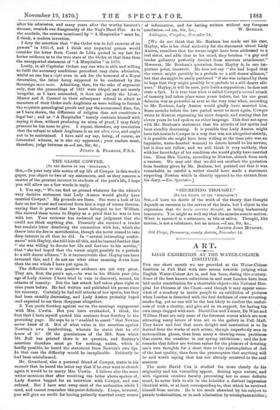THE GLOBE COWPER.
[TO THIS EDITOR OF THE "SPECTATOR.']
your very able notice of my life of Cowper in this week's Taper, you object to two of my statements, and as they concern a matter of the greatest interest to students of the poet's life, I hope _you will allow me a few words in reply.
1. You say, "We can find no ground whatever for the editor's wery decisive statement that Lady Austen would gladly have married Cowper." My grounds are these. She wore a lock of his hair on her breast and received from him a copy of verses thereon, The difficulties to this positive evidence are not very great. They are, first, the poet's age,—he was in his fiftieth year (the -age of Lady Austen I have tried in vain to discover), second, his -attacks of insanity. But the last attack had taken place eight or .nine years before. He had written and published his poems since his recovery. Certainly he had still attacks of low spirits, but they had been steadily decreasing, and Lady Austen probably hoped -and expected to see them disappear altogether. 2. You quote Southey against me on the marriage engagement with Mrs. Unwin. But you have overlooked, I think, the tract that I have myself quoted this sentence from Southey in the preceding page. He says he is "enabled to assert " that Newton never knew of it. But of what value is the assertion against Newton's own handwriting, wherein he states that he did Arnow of it? Of the genuineness of the MS. from which Mr. Bull has printed there is no question, and Southey's Assertion therefore must go for nothing, unless, which is hardly possible, he heard the statement from Newton's own lips. in that case the difficulty would be inexplicable. Evidently he 'had been misinformed. Mr. Greatheed, also a personal friend of Cowper, states in his memoir that he heard the latter say that if he ever went to church -again it would be to marry Mrs. Unwin. I believe also the same writer mentions that after receiving the letter above spoken of, Lady A.usten begged for an interview with Cowper, and was 'refused. But I have sent away most of the authorities which I 'used, and cannot remember this point definitely. I hope, however, you will give me credit for having patiently searched every source of information, and for having written without any foregone conclusion.—I am, Sir, &c., W. BENHAM. Addington, Croydon, November 14. [We do not think that Mr. Benham has made out his case. Hayley, who is his chief authority for the statement about Lady Austen, considers that the verses might have been addressed to a. real sister, and adds that to his mind, they betoken "a gay and tender gallantry perfectly distinct from amorous attachment." Moreover, Mr. Benham's quotation from Hayley is, in one im- portant point, incorrect. He does not say "she had hoped that the verses might possibly be a prelude to a still dearer alliance," but that she might be easily pardoned "if she was induced by them to hope that they might possibly be a prelude to a still dearer alli- ance." Hayley, it will be seen, puts forth a supposition ; he does not state a fact. It is true that what is called Cowper's second attack of insanity had taken place some years before, but his one great delusion was as powerful as ever at the very time when, according to Mr. Benham, Lady Austen would gladly have married him. Some months before the two parted never to meet again, Cowper wrote to Newton expressing his utter despair, and stating that for eleven years he had spoken no other language. This does not agree with Mr. Benham's statement that his attacks of low spirits had been steadily decreasing. It is possible that Lady Austen might have felt towards Cowper in a way that was not altogether sisterly, it is possible she might have been willing at the time (she was an impulsive, warm-hearted woman) to devote herself to his service, but it does not follow, and we still think it very unlikely, that with her knowledge of his condition she would gladly have married him. Even Mrs. Unwin, according to Newton, shrank from such a venture. We may add that we did not overlook the quotation from Southey given by Mr. Benham, but pointed out that it was remarkable so careful a writer should have made a statement respecting Newton which is directly opposed to the extract from his diary.—En. Spectator.]


































 Previous page
Previous page